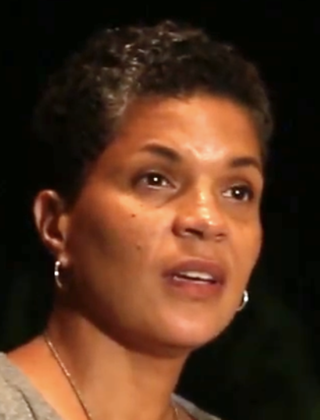
Michelle Alexander is an American writer, attorney, and civil rights activist. She is best known for her 2010 book The New Jim Crow: Mass Incarceration in the Age of Colorblindness. Since 2018, she has been an opinion columnist for the New York Times.
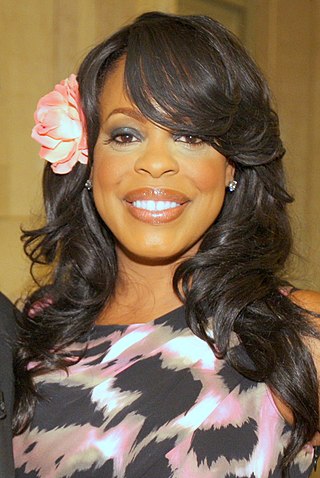
Carol Denise Betts is an American actress and television host. Her acting career began in the late 1990s, with appearances in the films Boys on the Side (1995) and Cookie's Fortune (1999). She garnered recognition for her portrayal of Deputy Raineesha Williams in the comedy series Reno 911!, along with hosting the Style Network show Clean House (2003—2010), for which she won a Daytime Emmy Award.
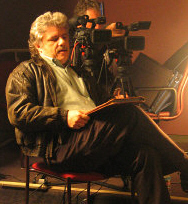
William Gazecki is an American film director and former sound mixer best known for his documentary Waco: The Rules of Engagement (1997), which earned a News & Documentary Emmy Award and was nominated for an Academy Award for Best Documentary Feature. The film premiered at the Sundance Film Festival, was awarded the International Documentary Association's Distinguished Documentary Achievement Award, and won awards at both the Melbourne International Film Festival and the Vancouver International Film Festival. Gazecki was nominated another three times for an Emmy award, and for an Academy Award in 1998.
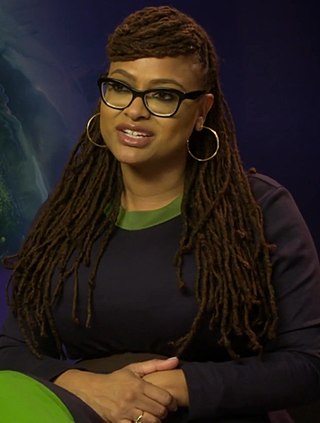
Ava Marie DuVernay is an American filmmaker, screenwriter, and producer. She is a recipient of a Primetime Emmy Award, two NAACP Image Award, a BAFTA Film Award, and a BAFTA TV Award, as well as a nominee of an Academy Award and Golden Globe. In 2011, she founded her independent distribution company ARRAY.
Black women filmmakers have made contributions throughout the history of film. According to Nsenga Burton, writer for The Root, "the film industry remains overwhelmingly white and male. In 2020, 74.6 percent of movie directors of theatrical films were white, showing a small decrease from the previous year. In terms of representation, 25.4 percent of film directors were of ethnic minority in 2020. Of the 25.4 percent of minority filmmakers, a small percentage was female.

Middle of Nowhere is a 2012 American independent drama film written and directed by Ava DuVernay and starring Emayatzy Corinealdi, David Oyelowo, Omari Hardwick and Lorraine Toussaint. The film was the winner of the Directing Award for U.S. Dramatic Film at the 2012 Sundance Film Festival.
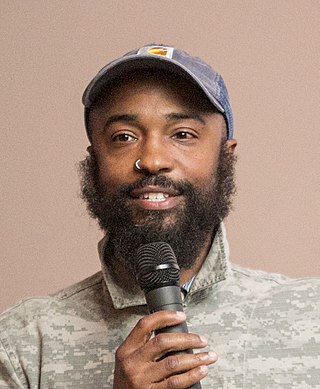
Bradford Marcel Young, A.S.C is an American cinematographer. He is best known for his work on the films Selma, A Most Violent Year, Arrival (2016)—which earned him a nomination for an Academy Award for Best Cinematography—and Solo: A Star Wars Story (2018), as well as the Netflix miniseries When They See Us (2019).
Howard Barish is president and CEO of Kandoo Films, an Oscar nominated, Emmy award winning entertainment company known for its producing partnership with Ava DuVernay. Barish and Kandoo's most recognized project to date, 13th, is a 2016 American documentary from Netflix directed by DuVernay. Centered on race in the United States criminal justice system, the critically lauded film is titled after the Thirteenth Amendment to the United States Constitution, which outlawed slavery. It argues that slavery is being effectively perpetuated through mass incarceration.
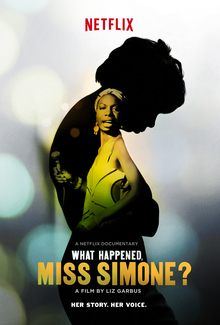
What Happened, Miss Simone? is a 2015 American biographical documentary film about Nina Simone directed by Liz Garbus. The film opened the 2015 Sundance Film Festival. The screening was followed by a tribute performance by John Legend. The film was released by Netflix on June 26, 2015. It was nominated for Best Documentary Feature at the 88th Academy Awards.

Kristopher Bowers is an American composer, pianist and documentary director. He has composed scores for films, including Green Book, King Richard, and The Color Purple, and television series, among them Bridgerton, Mrs. America, Dear White People, and When They See Us.
ARRAY is an independent distribution company launched by film maker and former publicist Ava DuVernay in 2011 under the name African-American Film Festival Releasing Movement (AFFRM). In 2015, the company rebranded itself as ARRAY.
Marie Gottschalk is an American political scientist and professor of political science at the University of Pennsylvania, known for her work on mass incarceration in the United States. Gottschalk is the author of The Prison and the Gallows: The Politics of Mass Incarceration in America (2006) and Caught: the Prison State and the Lockdown of American Politics (2016). Her research investigates the origins of the carceral state in the United States, the critiques of the scope and size of the carceral network, and the intersections of the carceral state with race and economic inequality.
August Greene is an American supergroup. The brainchild of rapper Common, and producers Robert Glasper and Karriem Riggins, it was formed in 2018 after sharing the Primetime Emmy Award for Outstanding Original Music and Lyrics for their song "Letter to the Free", which was part of Ava DuVernay's Netflix documentary 13th (2016).

When They See Us is a 2019 American crime drama television miniseries created, co-written, and directed by Ava DuVernay for Netflix, that premiered in four parts on May 31, 2019. It is based on events of the 1989 Central Park jogger case and explores the lives and families of the five Black and Latino male suspects who were falsely accused then prosecuted on charges related to the rape and assault of a white woman in Central Park, New York City. The series features an ensemble cast, including Jharrel Jerome, Asante Blackk, Caleel Harris, Jovan Adepo, Michael K. Williams, Logan Marshall-Green, Joshua Jackson, Blair Underwood, Vera Farmiga, John Leguizamo, Felicity Huffman, Niecy Nash, Aunjanue Ellis, Marsha Stephanie Blake, and Kylie Bunbury.

American Factory is a 2019 American documentary film directed by Steven Bognar and Julia Reichert, about Chinese company Fuyao's factory in Moraine, a city near Dayton, Ohio, that occupies Moraine Assembly, a shuttered General Motors plant. The film had its festival premiere at the 2019 Sundance Film Festival. It is distributed by Netflix and is the first film acquired by Barack and Michelle Obama's production company, Higher Ground Productions. It won an Academy Award for Best Documentary Feature.

Marsha Stephanie Blake is an American actress. She is best known for her role as Linda McCray in the Netflix miniseries When They See Us, for which she was nominated for the Primetime Emmy Award for Outstanding Supporting Actress in a Limited Series or Movie.
Kerstin Emhoff is an American film producer and the co-founder and CEO of the commercial production company Prettybird and creative studio Ventureland. She is a member of the DGA, PGA, and Television Academy.

Jaden Michael is an American actor and model. He is known for portraying young Colin Kaepernick in the coming-of-age web series Colin in Black & White (2021), which follows Kaepernick's early years. He played the lead role of Mickey Bolitar in the Prime Video series Harlan Coben's Shelter.

Origin is a 2023 American biographical drama film written and directed by Ava DuVernay. It is based on the life of Isabel Wilkerson, played by Aunjanue Ellis-Taylor, as she writes the book Caste: The Origins of Our Discontents. Over the course of the film, Wilkerson travels throughout Germany, India, and the United States to research the caste systems in each country's history.














